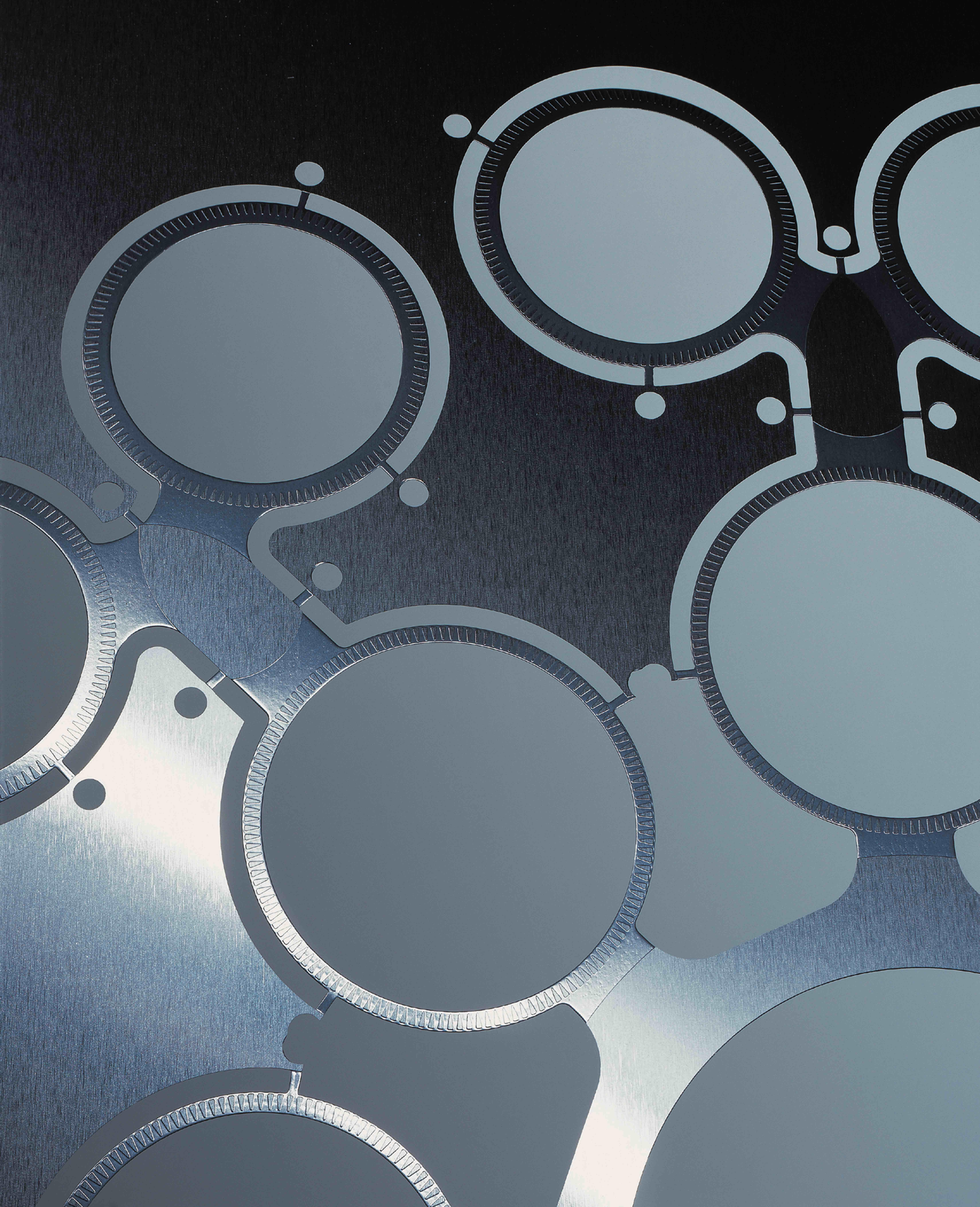
Photochemical etching is a metal processing technology that produces stress-free, flat components by selective etching through a photo-resist mask. It is especially well suited to the manufacturing of precision parts such as grids and meshes, precision filters, sharp piercing or cutting edges, lead frames for integrated circuit boards, fuel cell and heat exchanger plates, precision springs, and washers and gaskets.
In the area of mesh and filter fabrication, the unique innovations that micrometal GmbH has developed to enhance standard and traditional PCE technologies have led to several possibilities in design, and tolerance attainment, until now impossible.
Jochen Kern, head of sales and marketing at micrometal said, “When compared with conventional production processes, PCE has several inherent advantages, key among which are the ability to produce parts without degrading material properties, the fact that there is almost no limit on part complexity, and the ability to process a huge range of metals and alloys.

"At micrometal, we have a complete focus on the industrial production of high precision, repeatably accurate micro metal components, and to ensure this the company is constantly evolving the PCE process to offer far superior results than legacy PCE processes. There are three key areas that we have focused on.
"We use liquid resist rather than dry film resist that enables much higher precision; we offer a continuous PCE process that allows for endless strips of components to be made in huge volumes with no batch-to-batch variations; and we use digitally produced photo-tooling created on glass that achieves unrivaled resolution. Applying all this to the production of meshes and filters leads to some extraordinary results.”
When applied specifically to the manufacture of customized meshes and filters, PCE is characterized by several process advantages. Lead times are reduced dramatically, as are contingent costs, as tooling setup and iterations are quick and relatively simple. Being digital, the tooling for PCE can be manipulated on screen with ease and take a matter of hours rather than the days or weeks that would be expected with traditional processes.
Also, of particular interest to mesh manufacturers, special features and various aperture shapes can be incorporated into a single mesh without any cost penalty.

Varying bar sizes and open area ratios can be incorporated to control flow rates across the mesh, and something that appeals to design engineers across the industry is that micrometal’s PCE process allows for far greater open areas than is possible using alternative processing technologies due to its ability to produce tiny and intricate wire sizes.
When compared with woven meshes, the single-part meshes and grids that are produced with PCE can be more cost-effective to produce, and in many instances exhibit superior performance, and can be customized to a specific application or shape requirement. Meshes produced by micrometal are characterized by their consistent cross-sectional thickness and accuracy of aperture shapes and sizes, and as they are manufactured from a single piece of metal, they are slimmer, have greater integrity, and are robust when being handled.
Kern continued, “micrometal makes filters for customers requiring complexity and the achievement of extreme precision. We make filters and screens for a variety of applications in the petrochemical, food, medical, and automotive industries where complexity and precision are often combined with a need for high tensile strength. We offer special features and customized opening shapes with no cost increase, and a decisive advantage of free structural geometry. The versatility of micrometal’s PCE process removes the limitations OEMs consistently experience when designing filters and meshes. This allows us to innovate and open up the opportunity to produce truly customized filters and meshes that meet the exact requirements of a customer’s end-use application. We can produce highly complex filters and meshes in a variety of metals — including difficult-to-machine materials such as titanium and its alloys — so we can successfully achieve what customers may have previously thought impossible.”
The speed, cost efficiency, and accuracy of micrometal’s PCE process are critical for filter applications. So is the fact that parts are stress- and burr-free, geometric complexity is not constrained and does not increase costs, and design changes are quick and simple through the use of easy-to-create digital / glass tooling.
Using micrometal’s PCE process, very small passages with different geometries can be achieved, and customers benefit from an extremely wide range of design options and the choice of a huge variety of metals and alloys. As such, micrometal commands a significant market share in the production of intake grilles, filtration grilles, automotive interior grilles, implantable medical devices, diagnostic / laboratory medical test equipment, and valves.
Contact Details
Related Glossary Terms
- alloys
alloys
Substances having metallic properties and being composed of two or more chemical elements of which at least one is a metal.
- flat ( screw flat)
flat ( screw flat)
Flat surface machined into the shank of a cutting tool for enhanced holding of the tool.
- tensile strength
tensile strength
In tensile testing, the ratio of maximum load to original cross-sectional area. Also called ultimate strength. Compare with yield strength.
- tolerance
tolerance
Minimum and maximum amount a workpiece dimension is allowed to vary from a set standard and still be acceptable.







